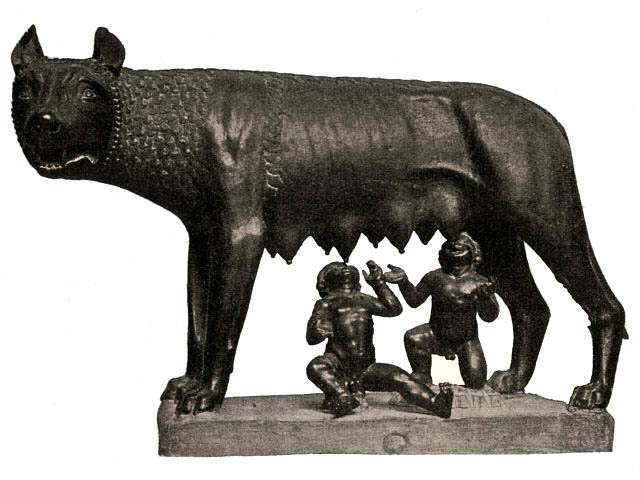
When we look at the extent of the Roman Empire on a map, we hardly imagine that this civilization originated from a small town in the Italian peninsula. Nestled in the central portion of this territory, the city of Rome was born through the efforts of the Latins and Sabines peoples who around 1000 BC had erected a fort that would prevent the incursion of the Etruscans.
The few details about the origins of Rome are shrouded by the classic mythical explanation that attributes its foundation to the action taken by the brothers Romulus and Remus. After founding Rome would have experienced its monarchic period, where the king established its political hegemony over the entire population and had the support of a Council of Elders known as the Senate.
The members of the Senate came from the patrician class, who had control over the large and fertile farms of the region. Over time, the economic hegemony of this elite allowed the formation of a republican regime in which the Senate took major political tasks. Between the 6th and 1st centuries BC, the republican regime guided the political life of Roman citizens.
However, the patrician hegemony was increasingly opposed by commoners who occupied the ranks of the army and guaranteed military protection of the Roman areas. Progressively, the plebeian class came to enjoy rights within the republican regime and make laws that target the rights and obligations that this social group had.
Despite these reforms, social inequality continued to prevail upon a society that started to depend increasingly on the workforce of its slaves. The territorial conquests enriched the Roman elites and determined the dependence of a mass of commoners who could not find work opportunities. In fact, social tensions were constant and showed the differences of the Roman world.
Gradually, the social tensions widened with the rise of military leaders (generals) who coveted to take front of the Roman state. The attempted coup signaled the undoing of the republican power and paved the way that turned Rome into an Empire. In the 1st century BC, the general Octavius finally managed to establish the imperial order.
During the Empire, we see the rise of governments that kept order, as well as other leaders who imbibed the power won. In the 1st century AD, the development of the Christian religion was a fundamental point in the transformation of the Empire. The religious and expansionary doctrine contradicted the beliefs (polytheism) and institutions (slavery) that held up the Roman world.
Around the 3rd century, the advent of the Barbarian invasions and the disruption of the expansion of territories marched in favor of the dissolution of this Empire. Despite the defeat imposed on the Romans, their practices, concepts and knowledge are still fundamental to understanding the shape of the Western world. In a sense, all roads still lead us (a little) to Rome.
The few details about the origins of Rome are shrouded by the classic mythical explanation that attributes its foundation to the action taken by the brothers Romulus and Remus. After founding Rome would have experienced its monarchic period, where the king established its political hegemony over the entire population and had the support of a Council of Elders known as the Senate.
The members of the Senate came from the patrician class, who had control over the large and fertile farms of the region. Over time, the economic hegemony of this elite allowed the formation of a republican regime in which the Senate took major political tasks. Between the 6th and 1st centuries BC, the republican regime guided the political life of Roman citizens.
However, the patrician hegemony was increasingly opposed by commoners who occupied the ranks of the army and guaranteed military protection of the Roman areas. Progressively, the plebeian class came to enjoy rights within the republican regime and make laws that target the rights and obligations that this social group had.
Despite these reforms, social inequality continued to prevail upon a society that started to depend increasingly on the workforce of its slaves. The territorial conquests enriched the Roman elites and determined the dependence of a mass of commoners who could not find work opportunities. In fact, social tensions were constant and showed the differences of the Roman world.
Gradually, the social tensions widened with the rise of military leaders (generals) who coveted to take front of the Roman state. The attempted coup signaled the undoing of the republican power and paved the way that turned Rome into an Empire. In the 1st century BC, the general Octavius finally managed to establish the imperial order.
During the Empire, we see the rise of governments that kept order, as well as other leaders who imbibed the power won. In the 1st century AD, the development of the Christian religion was a fundamental point in the transformation of the Empire. The religious and expansionary doctrine contradicted the beliefs (polytheism) and institutions (slavery) that held up the Roman world.
Around the 3rd century, the advent of the Barbarian invasions and the disruption of the expansion of territories marched in favor of the dissolution of this Empire. Despite the defeat imposed on the Romans, their practices, concepts and knowledge are still fundamental to understanding the shape of the Western world. In a sense, all roads still lead us (a little) to Rome.
Nenhum comentário:
Postar um comentário